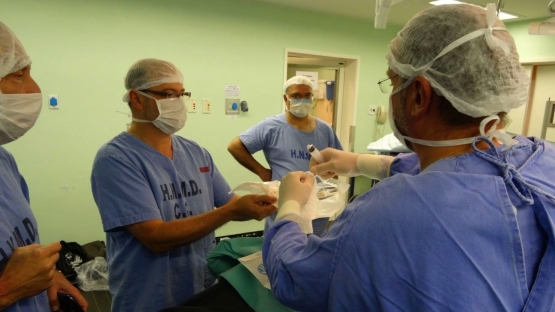When used, transported and stored under the appropriate conditions, nuclear technology can safely and securely contribute to the fields of electricity generation, industry and medicine, amongst others. However, due to accidents, natural disasters or malicious acts, emergencies can and do happen. One of the statutory functions of the IAEA is to strengthen nuclear safety and security by supporting the efforts of Member States to strengthen their emergency preparedness and response (EPR) capabilities.
With the support of Member States and the European Union (EU), the IAEA's technical cooperation (TC) programme is helping Member States to improve their ability to respond effectively in the event of a nuclear or radiological emergency. The EU has funded expert missions, training courses and hands-on workshops to strengthen existing response systems and establish new ones, with the ultimate aim of enhancing national response to radiation emergencies.
In order to ensure sustainability in EPR planning, the IAEA designates capacity building centres (CBCs) to support the ongoing development of emergency preparedness and response capabilities nationally, regionally and inter-regionally. CBCs will serve both as a focal point and a host for capacity building efforts through education, training and information sharing activities promoted by the IAEA, and will assist stakeholders in Member States in evaluating their EPR arrangements and corresponding needs.
Between 2009 and 2012, a number of radiological accidents involving industrial radiography sources occurred in Latin America, resulting in severe injuries. The affected countries requested IAEA support under the Convention on Assistance in Case of a Nuclear Accident or Radiological Emergency (Assistance Convention) and through the IAEA's Response and Assistance Network (RANET). The complexity of the injuries required specialized medical expertise, and patients were flown thousands of kilometres to receive specialised treatment in France and in Brazil.
With these experiences in mind, the IAEA is working with Member States in the Latin America region to establish a capacity building centre that will specialize in strengthening the medical management of radiation emergencies. With the support and financial contributions of France and the European Union, an ongoing regional project-designated RLA/9/076-is conducting preliminary evaluations to identify countries that could potentially host medical CBCs in the region. Furthermore, an expert mission in cooperation with Percy Hospital and the Institute for Radiological Protection and Nuclear Safety in France was implemented in Brazil to learn about national medical capabilities in the region. Experts from France, Argentina, Brazil, and Chile participated in this mission.
Similar activities are underway in the Asia and the Pacific Region, where lessons continue to be drawn from the aftermath of 2011 Fukushima-Daiichi nuclear accident. An ongoing, regional TC project is building on the earlier efforts to strengthen both national and regional EPR capabilities. Project RAS/9/068 aims to strengthen and harmonize the capabilities for responding to nuclear and radiological emergencies of the 28 participating Member States following the IAEA's Safety Standards, particularly GS-R-2, which establishes the requirements for an effective response to such emergencies. Thanks in part to funds awarded by the European Union, RAS/9/068 was able to support national and regional training courses, fact-finding missions and regional coordination meetings. On-the-job fellowships at the Agency's Incident and Emergency Centre (IEC) were also included in this project.
Technical cooperation projects to improve national EPR capabilities in the Africa region have also benefitted from the support of the European Union. Reflecting the emergence of radiotherapy facilities in Africa, RAF/9/052 has focused on the creation, review, and implementation of national radiation emergency plans, with particular attention paid to the needs of high-priority Member States.
In the event of a nuclear or radiological emergency, the potential impacts will neither observe nor respect international boundaries. An emergency in one Member State could have public health implications for other countries, regardless of the latter's level of engagement with nuclear technology. The support and financial contributions of the European Union reflect an important fact: if the challenge of emergency preparedness and response is international, so too must be the corresponding solutions. By connecting and encouraging collaboration between national and international stakeholders, the IAEA can continue to fortify the ability of Member States to quickly react to unfolding emergencies, wherever they occur.
| Projects RLA/9/076, RAS/9/068 and RAF/9/052 are carried out with funding from the European Union |



